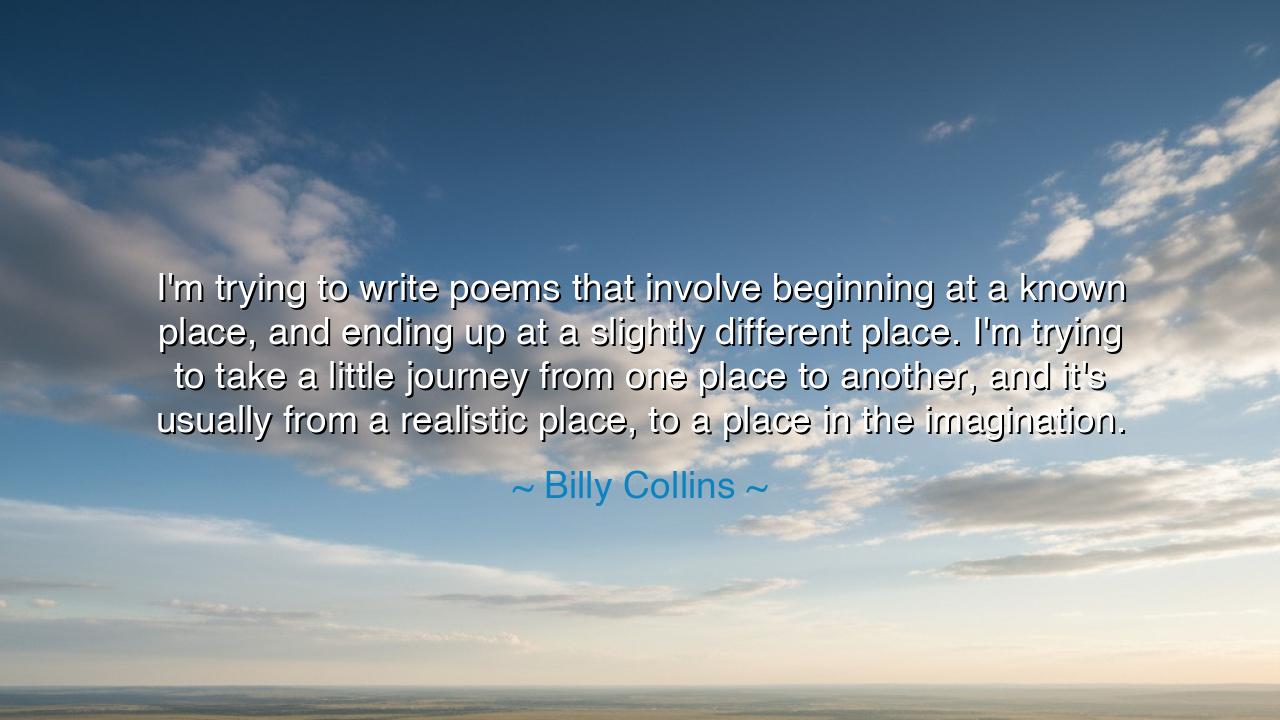
I'm trying to write poems that involve beginning at a known
I'm trying to write poems that involve beginning at a known place, and ending up at a slightly different place. I'm trying to take a little journey from one place to another, and it's usually from a realistic place, to a place in the imagination.






“I'm trying to write poems that involve beginning at a known place, and ending up at a slightly different place. I'm trying to take a little journey from one place to another, and it's usually from a realistic place, to a place in the imagination,” said Billy Collins, the modern poet laureate of tenderness and wit. In this simple yet profound statement, Collins unveils the sacred architecture of poetry — a movement, a transformation, a journey of the mind and soul. The poet, he suggests, is not merely a recorder of life but a traveler through its hidden layers, beginning in the familiar realm of reality and ending in the luminous terrain of imagination. His words remind us that art, like life itself, exists to lead us from what is known to what is possible.
Collins’ vision of poetry is a pilgrimage of awareness. The poet begins among ordinary things — a cup of coffee, a quiet morning, a passing thought — but through reflection and language, he travels beyond them, into a realm where meaning deepens and the mundane becomes radiant. This is not escapism; it is transformation. The realistic place is the root, the grounding of human experience. The imaginative place is the flowering of that experience into wisdom. Collins teaches that the act of writing — and of living — is not to remain fixed where one begins, but to arrive changed, to cross the unseen bridge between fact and wonder.
This journey mirrors the oldest traditions of storytelling and myth. The ancients understood that every true tale begins in the village and ends in the stars. Odysseus began at home and wandered across oceans not only to return, but to return different. Dante began in a dark wood — a place of confusion and despair — and through poetry, descended into Hell and rose to Heaven, his soul illuminated by vision. Likewise, Billy Collins, though a poet of modern life, walks this same path. He begins with the “known place” — the tangible, the real — and through the alchemy of imagination, turns it into revelation. His poems often start with humor or simplicity but end with silence, awe, or recognition — that subtle shift where the reader realizes they, too, have traveled.
To move from the realistic to the imaginative is to mirror the very process of human consciousness. For the mind does not dwell solely in what it perceives; it reaches, forever, toward what it can envision. It is this reaching — this creative leap — that makes us human. A poet merely gives this universal instinct a voice. In Collins’ words, we see the poet as a guide, leading the reader through the world they know into one they have never seen, though it has always lived within them. In this way, poetry becomes a map of the human journey — from outer perception to inner revelation.
We find the same principle in the work of William Blake, who declared that “imagination is the real and eternal world of which this vegetable universe is but a shadow.” For Blake, as for Collins, imagination is not fantasy but truth — the truer vision that lies beneath the surface of the ordinary. A street becomes a symbol, a gesture becomes an epiphany. Collins’ journey, then, is the poet’s ancient calling: to reveal the infinite hidden within the finite, to turn the world inside out until its deeper meaning shines through.
This idea can also be traced to the practice of Zen, where enlightenment is often reached through the contemplation of simple, ordinary moments — the sound of rain, the lighting of a candle, the boiling of rice. Through attention and awareness, the mundane becomes miraculous. Collins’ poems perform a similar spiritual gesture. They begin in what is familiar and end in what is sacred, showing that the door to the imagination is never far away; it is hidden in plain sight, waiting for the mind to open it.
And so, the lesson unfolds: every life is a poem, and every day offers us a chance to move from the known to the imagined, from habit to wonder. Whether we are poets or not, we can all practice this art of transformation — to look at the world not as something fixed, but as something alive, waiting to reveal its mystery. Begin with what you see, but do not stop there. Ask what it means. Ask what it could become. Let your imagination lead you a little further than your comfort, and you will find yourself changed.
Thus, as Billy Collins teaches, do not be afraid of the small journey — the “little journey” of thought, of perception, of creation. Every time you see the ordinary through the lens of imagination, you cross from the visible into the eternal. For that is the work of both poetry and life: to take what is real and make it radiant, to step each day into the world as it is, and through the power of vision, discover the world as it might be.






AAdministratorAdministrator
Welcome, honored guests. Please leave a comment, we will respond soon